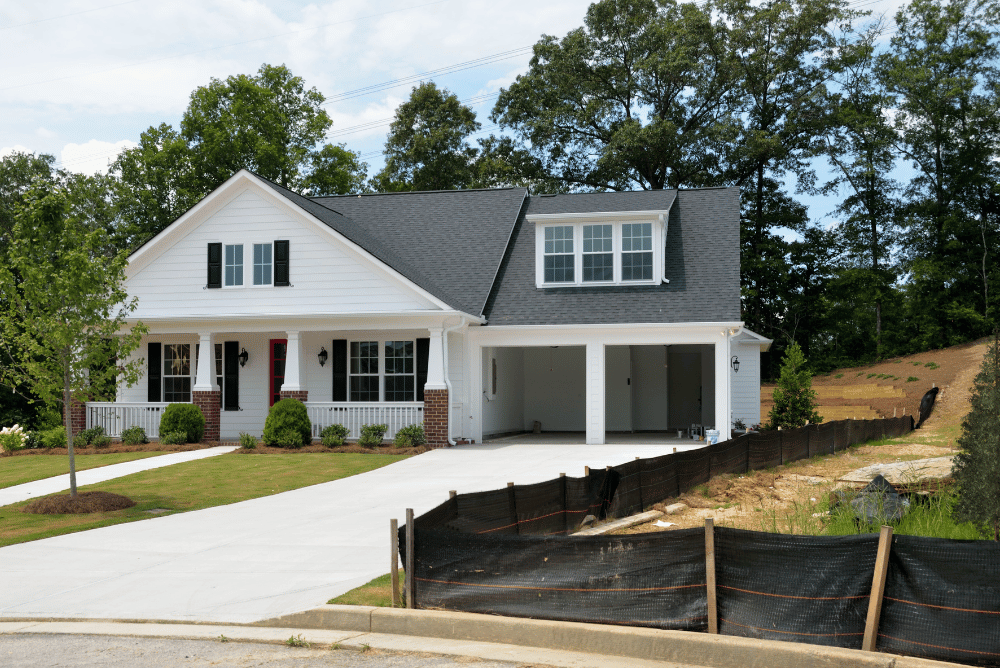While buying a new construction home is an exciting opportunity, it’s still important to do your homework beforehand. New homes come with all the latest and greatest appliances, building materials, and modern features. But just because a house is brand new, doesn’t mean it’s perfect. As a buyer, you need to do a home inspection and ask the right questions to ensure that you’re getting what you expect.
Who is the builder?
Before purchasing a new construction home, always find out everything you can about the builder’s reputation. Often, builders and/or developers post their information on signs while homes are being constructed. Driving by homes they’ve built will help you collect this information. If, for some reason, there isn’t any information available, then contact the Kitsap County Community Development Department. They should have a record of who submitted the building permit on file.
Once you have the builder’s name, take time to look them up on the Washington State Department of Labor and Industries website. This department oversees all licensed contractors. If a builder is not listed, call the department directly to learn more. You want to make sure the builder is licensed to work in Washington. You also want to avoid builders with safety citations, other infractions, or any pending lawsuits. As you do more research and discover subcontractors working on the project, look them up as well.
Also, read builders’ reviews online and take time to talk to their previous clients if possible. These one-on-one conversations are most informative because you are able to ask specific questions and receive honest feedback. Often people are more willing to share during a chat than in an online review that’s public for all the world to read. If you are able to, check out other homes the builder has built locally to see how they are holding up over time. Local Realtors and home inspectors are great resources and can also provide other valuable builder details. In small communities like ours, local expertise goes a long way. A local real estate agent who is well-connected can connect you to the right people and give you the inside scoop on a nearby housing development or a new build that you may be eyeing.
What is the timeline?
If you want to move in by a certain date, it’s imperative to understand the new home construction timeframe. Construction timelines vary greatly and depend on the size and complexity of the home. Establish a deadline at the beginning with project milestones outlined to remain on track.
Unfortunately, delays with new construction homes are common due to unforeseen issues. These can include supply chain interruptions, bad weather conditions, and staffing issues. Keep in mind that if construction changes are requested midway, this will also delay the timeline. Try to keep your expectations realistic, make sure you’re working with communicative, transparent people, and be as flexible as possible. Additionally, it’s imperative that you read the fine print in any contracts to ensure that sections about delays are reasonable and protections for you are built in.
What is the new construction home warranty?
Before signing a contract, make sure the new construction home warranty is outlined clearly by the builder. Washington State is unique, thanks to a state law giving homeowners a six-year statute of limitations for construction defects on a new home. Despite the existence of this law, many builders include a one-year warranty in their contracts. In 2022, the Washington State Supreme Court decided in the case Tadych v. Noble Ridge Construction, Inc. that the one-year warranty is void and unenforceable because it does not meet the requirements of state law.
As a result of the Washington State Supreme Court’s decision, any contract that includes a builder warranty of less than six years is potentially unenforceable. However, it’s good to consult a lawyer to make sure you and the builder are on the same page, and both understand state law requirements. And even with a home warranty, it’s important to have your new construction home inspected by a professional to ensure everything is delivered as promised. By doing so, anything that needs to be fixed can be dealt with before you move in.
What are the home’s special features?
Many builders offer a standard set of features in a home. Make sure you understand what will be included. If you would like certain upgrades or customizations, get detailed information on those additional costs to avoid surprises. Typically, potential upgrades include nicer cabinets, hardwood or tile flooring, and custom countertops. If you do decide to upgrade, those changes and costs are added to the contract to avoid misunderstandings.
Buying a new construction home is also an opportunity to incorporate energy-efficient features. These features are great because they can save you money in the long run and also help reduce your carbon footprint. Potential options include LED lighting, tankless water heaters, and an energy-efficient HVAC system. While these features often cost more upfront, they also increase a home’s resale value and pay for themselves down the road.
How do I obtain financing?
You’ll need to get pre-approved for a mortgage and have enough to make a down payment. Also, there isn’t as much room for negotiation in new construction home transactions. This is where your real estate agent’s expertise comes in. Talk to them and establish what kind of offer you are able to make. This helps you and your agent identify the best available properties that meet your budget, timeline, and needs. Use a mortgage calculator to examine varying home prices and what you can afford.
If you have a specific question about new home construction that we weren’t able to answer here, feel free to contact one of our agents.
 Facebook
Facebook
 X
X
 Pinterest
Pinterest
 Copy Link
Copy Link
